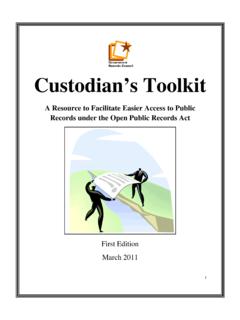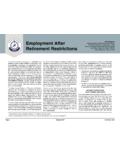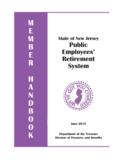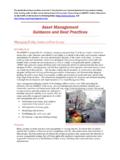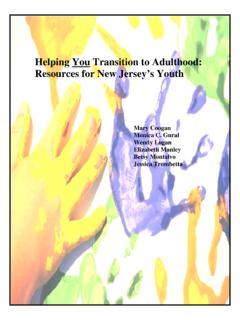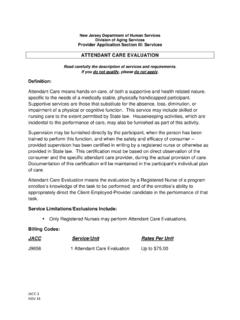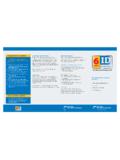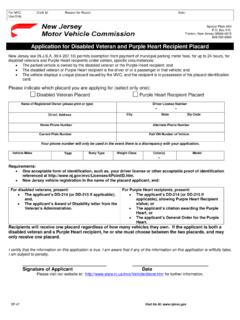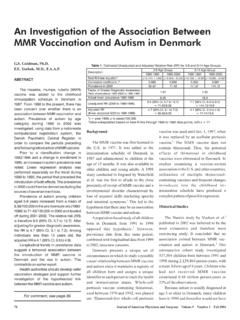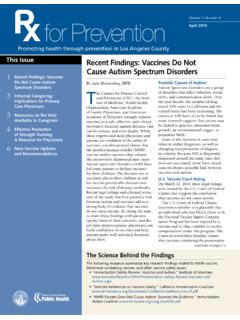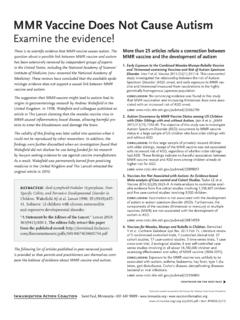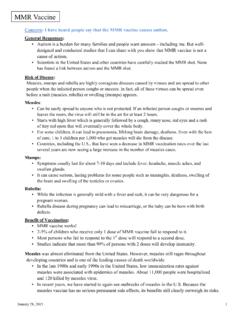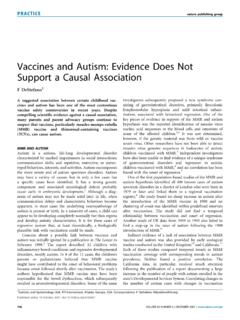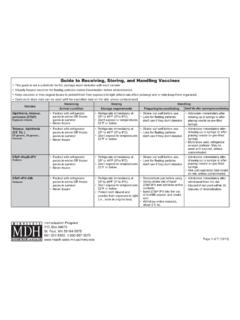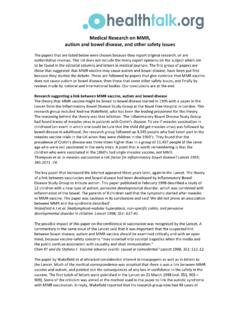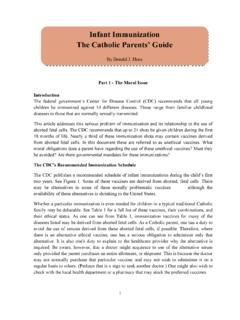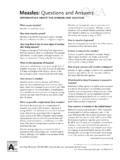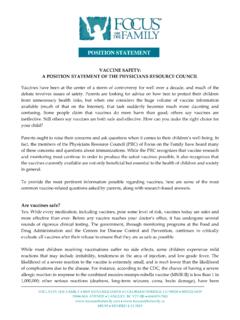Transcription of NJ Department of Health Vaccine Preventable Disease Program
1 FOR LOCAL Health DEPARTMENTS AND Health CARE PROVIDERS CHILD CARE/PRESCHOOL REQUIREMENTS FOR LOCAL Health DEPARTMENTS AND Health CARE PROVIDERS: CHILD CARE/PRESCHOOL REQUIREMENTS NJ Department of Health Vaccine Preventable Disease Program New Jersey Minimum Immunization Requirements for Child Care/Preschool Attendance 8:57-4 Immunization of Pupils in School Guide for checking compliance Step 1: Each child attending/enrolling must present proof of immunity or valid medical or religious exemption to vaccines. Step 2: Determine child s present age. Step 3: Find a ppropriate age range; if child falls between stated ages use lower age range requirements. Step 4: Compare record received with requirements listed on the chart below. Age at which children must have vaccines to be in compliance: Minimum Number of Doses Required for Each Vaccine DTaP Polio Hib Pneumococcal (PCV) MMR Varicella Influenza By 3 months 1 dose 1 dose 1 dose 1 dose None None None By 5 months 2 doses 2 doses 2 doses 2 doses None None None By 7 months 3 doses 2 doses 2 doses 2 doses None None 1 dose * By 11 months 3 doses 2 doses 2 doses 2 doses None None 1 dose By 14 months 3 doses 2 doses 1-4 doses (see footnote) 1-4 doses (see footnote) None None 1 dose By 16 months 3 doses 2 doses 1-4 doses (see footnote) At least 1 dose given on or after the first birthday 1 dose None 1 dose By 19 months 4 doses 3 doses At least 1 dose given on or after the first birthday.
2 At least one dose given on or after the first birthday. 1 dose None 1 dose By 20 months 4 doses 3 doses At least 1 dose given on or after the first birthday. At least one dose given on or after the first birthday. 1 dose 1 dose 1 dose Additional vaccines are recommended by the Advisory Committee on Immunization Practices (ACIP). The chart above lists only the v accines that are required for child care/preschool attendance in NJ. For the complete ACIP Recommended Immunization Schedule, please visit Footnotes *The current seasonal influenza Vaccine is required every year for children 6 months through 59 months of age. Students who have not received the flu Vaccine by December 31 must be excluded (not allowed to attend child care/preschool) for the duration of influenza season (through March 31), until they receive at least one dose of the influenza Vaccine or until they turn 60 months of age (5 years old).
3 Children enrolling in child care/preschool after December 31, must provide documentation of receiving the current seasonal flu Vaccine before being allowed to enter school. Students enrolling in school after March 31 are not required to receive the flu Vaccine ; however, flu season may extend until May and therefore getting a flu Vaccine even late in the season is still protective. Haemophilus influenzae type b (Hib) and pneumococcal (PCV) vaccines are special cases. If a child started late with these vaccines he/she may need fewer doses. One dose of each is required on or after the first birthday in all cases. Example #1: Children 12 through 59 months: A child 12 through 59 months of age entering child care/preschool will need to show documentation of receiving at least 1 dose each of Hib and PCV vaccines in order to be allowed entry into child care/preschool.
4 If the child has a dose of Hib and PCV administered on or after the first birthday no further doses of Hib or PCV will be required. However, additional doses may be recommended by ACIP for optimal protection. Example #2: Children under 12 months of age: A child under 12 months of age attending child care/preschool should have at least 2 doses each of Hib and PCV given between 2 through 11 months of age. In addition, a dose of both PCV and Hib vaccines are required on or after the first birthday. NOTE: The use of combination vaccines may allow students to receive the 1st birthday booster dose of Hib between 15-18 months of age; therefore, the child will not be considered deficient until 19 months of age. MMR Vaccine may be given as early as 12 months of age, but NJ requires children to receive the Vaccine at 15 months of age. Prior to age 15 months, a child may enter preschool/child care without a documented dose of MMR.
5 A child who does not have one documented dose of MMR Vaccine by 16 months (once they turn 16 months) of age must be excluded from attending childcare/preschool until he/she receives the Vaccine . Varicella Vaccine may be given as early as 12 months of age, but NJ requires children to receive the Vaccine at 19 months of age. Prior to age 19 months, a child may enter preschool/child care without a documented dose of varicella. A child who does not have one documented dose of Varicella Vaccine by 20 months (once they turn 20 months) of age must be excluded from attending childcare/preschool until he/she receives the Vaccine . A child will not have to receive the varicella Vaccine if he/she previously had chickenpox as long as a parent can provide the school with one of the following: 1) Documented laboratory evidence showing immunity (protection) from chickenpox, 2) A physician s written statement that the child previously had chickenpox, or 3) A parent s written statement that the child previously had chickenpox.
6 Grace Periods: 4-Day Grace Period: All vaccines administered less than or equal to 4 days before either the specified minimum age or dose spacing intervals shall be counted as valid and shall not require revaccination in order to enter or remain in a school, preschool, or child care facility. Please note that ACIP does not recommend applying the four- day grace period for the dose spacing interval between two live vaccines. However, for auditing purposes, this will be acceptable. 30-Day Grace Period: Those children transferring into a NJ school, preschool, or child care facility from out of state/out of country shall be allowed a 30 day grace period in order to obtain past immunization documentation before provisional status begins. Page 2 of 7 Revised September 2014 Technical Guidance for Immunization Record Auditing For the complete list of NJ Immunization Requirements Frequently Asked Questions and to access Immunization Requirements Implementation Guidance please visit Immunization Records Q: does the state immunization registry, New Jersey Immunization Information System (NJIIS), produce an official record that can be used for immunization record auditing?
7 A. Yes, the NJIIS produces an official immunization record of a child s immunization history for child care, preschool, school, camp and college enrollment and can be used for immunization record auditing. Other examples of acceptable documents of immunization are the Department of Health , Standard School/Child Care Immunization record (also known as the IMM-8 or yellow card) and the Department of Education, State Health History and Appraisal Form (A-45). Q: Are out of state immunization information system (IIS) registry records acceptable as proof of vaccination? A. An official IIS record from another state is acceptable documentation of vaccination. Q. How are students who are schooled out of their home district audited? Who is responsible for those immunization records? A. Students attending schools out of their home district need to comply with NJ s immunization rules.
8 The district to which a child travels and is enrolled (the receiving district) is responsible for reviewing the student s immunization record. Q. Do immunization records of campers need to be audited by the local Health Department ? A. NJ Immunization of Pupils in Schools rules ( 8:57-4) apply to all children attending any public or private school, child care center, nursery school, preschool or kindergarten in New Jersey. There is not a requirement for local Health departments to audit immunization records in camps. However, according to NJ Youth Camp Standards ( 8:25), all campers shall be immunized in accordance with 8:57-4. It is the responsibility of the director/person in charge of the camp to ensure immunization records are on file for a camper. Those without vaccination due to medical or religious exemption should also be noted and able to be easily identified if necessary.
9 For complete access to the NJ Youth Camp Standards, please visit Q: Do immunization records for school-aged children attending a facility s before / after school Program need to be audited? A: The facility where the child attends school during daytime hours is responsible for ensuring the child s compliance with the NJ immunization rules. Records of school age children do not need to be reviewed in before/after school programs. Q. How is a record audited and not duplicated if a child attends two different programs within a municipality? A: It may be possible for a child to attend more than one licensed Program within a municipality. For example, wrap around programs may accommodate a student who attends kindergarten half day and later attends a childcare facility or an enrichment Program in the afternoon. If dual attendance is known, audit those students accordingly to prevent the child from being counted twice, otherwise audit all records.
10 Q. How are students without vaccination records accounted for on the IMM-15 report? A: The IMM-15 is the final report on the immunization status of students in your jurisdiction(s). Completion of the report is recommended to be done within 60 days post initial audit visit. NJ rules require all students attending school/preschool/childcare to present vaccination records on entry/enrollment. Therefore any child without a record must be excluded until documentation is presented. This rule does not apply to those students entering/enrolling from out of state or out of country. The 30-day grace period is allowed for these students. Review the Immunization Compliance Flow Charts at the link, for further information. Page 3 of 7 Revised September 2014 Exemptions Q: What should be included in an acceptable religious exemption? A: A religious exemption is not the same as a philosophical, moral or conscientious exemption.
